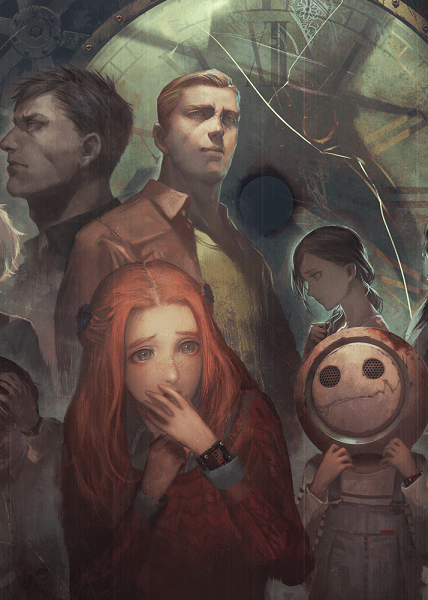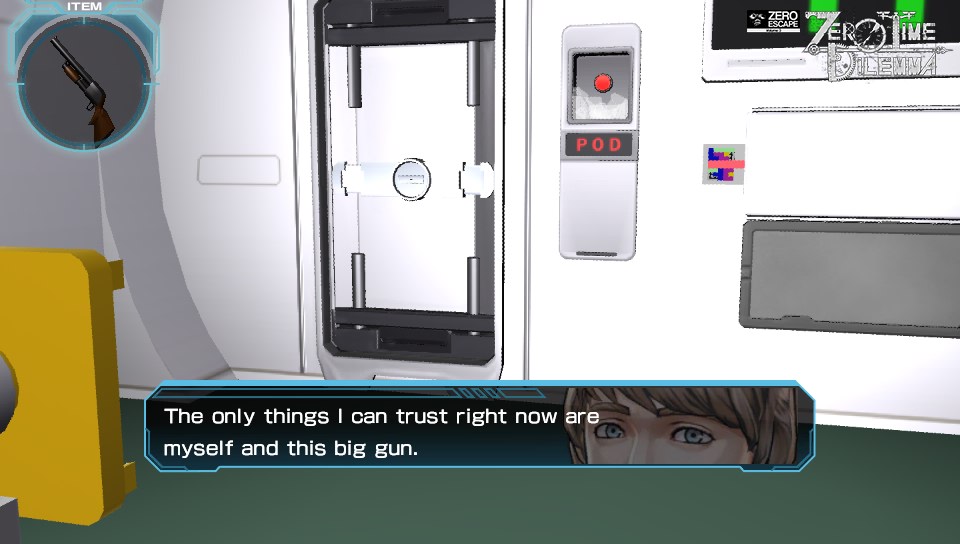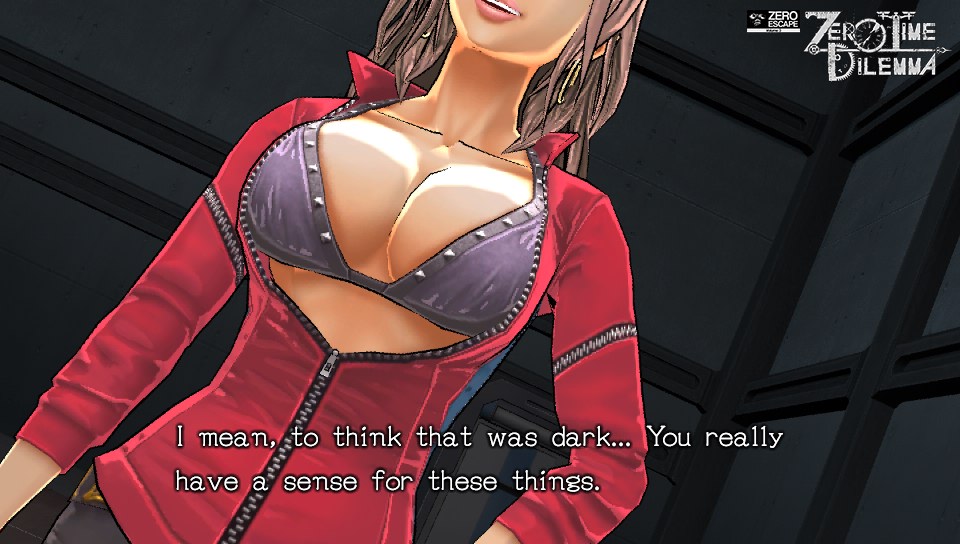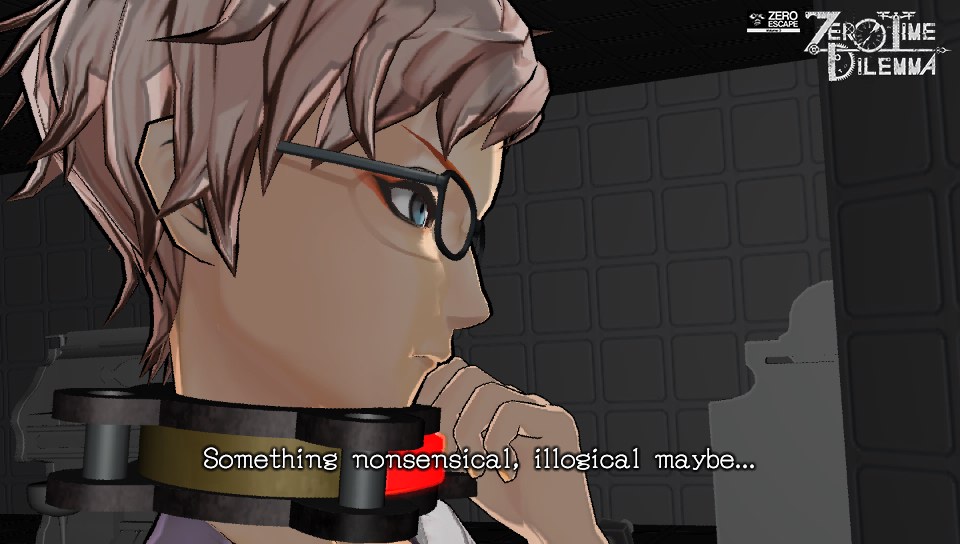
Zero Time Dilemma – Decision: Should you play this game? No
**
Reviewed June 30, 2016 on PlayStation Vita
Leave a comment on Giant Bomb
Before reviewing Zero Time Dilemma, I took a moment to reflect on what made the first game in the Zero Escape series, 999, special: the ending. The reveal in that game was masterful; it was entirely self-consistent, was subtly but convincingly foreshadowed, and built towards by the rest of the game. It also made fantastic use of the DS's multiple screens. To put it simply, when the reveal hits, it is impossible not to think "Oh wow" and marvel at how little pieces of the story suddenly fall into place. Unfortunately, much like its predecessor, Virtue's Last Reward (VLR), Zero Time Dilemma (ZTD) completely misses those marks and proves to be a frustrating and unsatisfying experience.
The rest of this review assumes a familiarity with 999 and Virtue's Last Reward, and may spoil elements of those games. This is necessary as it is, in part, the connection between the three games that makes Zero Time Dilemma disappointing
Structurally, the game is very similar to previous entries in the series. The game is essentially broken into two major elements - escape sequences, where the player must solve an intricate puzzle in order to escape the room in which the characters have been locked, and cinematic sequences that both provide the main thrust of the story and present the player with choices to be made. The puzzles, on the whole, are well designed and satisfying to solve, and never resort to being unfair or requiring guesswork to complete. Occasionally, it did feel as though I hadn't been told of the information that was needed, or that a clue didn't make sense, but after resolving the issue it was always the case that I had overlooked something or misinterpreted a clue that was obvious in hindsight.
Though there was one puzzle element that was re-used multiple times, and the puzzles here never quite give the "I can't believe I managed to work that out" feeling that those in Virtue's Last Reward did (they at times feel rather straightforward), it's difficult to fault these sections. If all the player wants is more rooms from which to escape, ZTD delivers.
Unfortunately, the cinematic sequences don't match up to the quality of the puzzles. Though well-directed, overall they look rather poor. Questionable art direction leads familiar characters, especially Kurashiki Akane and Tenmyouji Junpei, to be borderline unrecognisable, and the animations are stiff and unnatural. I remain convinced that a dog that appears in the game is a robot, despite there being no evidence of that, as his animations are so rigid and un-lifelike - I've seen more realistic motion from an Aibo. On the whole, the game would have been better served by sticking with the visual novel style presentation used in the previous games. This would have avoided the need for such a range of animations, and would also have made the game's reveal (discussed below) more believable.
The game's questionable art direction is especially apparent in the design on a new character, Mira. Though 999 and VLR both had a female character wearing less than is really appropriate, it is much more egregious here due to the move to a more-cinematic style of presentation. Much like Quiet in MGSV, it frequently feels that camera angles have been chosen to highlight her cleavage, which is rather off-putting.
Musically, the game borrows heavily from Virtue's Last Reward. This is no bad thing, as the music in that game is excellent, but it also leads to the game seeming incongruous at times - there is a definite split, both tonally and in terms of quality, between the new music and the old. Though the new additions to the soundtrack are not bad per se, they stand out as being different and not quite as good as the existing tracks. I chose to use the Japanese voice acting for this game (for the European release of Virtue's Last Reward, Japanese audio was the only option), and the quality of it is very high. I particularly enjoyed Zero's performance, but all of the characters are well-acted and enjoyable to hear.
It is narratively, however, where the game completely falls apart, in a way that largely mirrors my criticisms of Virtue's Last Reward. The first half or so of the game is excellent, and the individual moments are extremely well-written. There is one bad ending, in particular, which explores the aftermath of failing to escape from the facility that stands out as exceptional. However, the way plot threads come together and are resolved is completely disappointing, and does not live up to the first half of the game. It is particularly disappointing given how Virtue's Last Reward ended - the last hour of VLR was basically a sequel hook, with the implicit promise that questions will be answered in the next game. Zero Time Dilemma fails to address that ending in any meaningful way. For example, a character introduced at the end of VLR as being key to the events of ZTD hardly even gets a mention.
Furthermore, the game has rather severe pacing issues, and, like VLR, is very back-loaded. The first 15 or so hours of the game are well-written, but largely do not tie into the overall narrative. They are mainly focused on the situation at hand, and how the players will escape. The pacing for these sections is mostly good - the tension of the situation is built well, and few scenes drag on for longer than necessary. A few scenes are repeated with different characters, but this is largely necessary due to the non-linear nature of how the game is presented.
After the game's major reveal, however, the quality of the writing sharply declines, and the game suddenly feels very rushed. The game wraps up in about five hours, which simply does not provide enough time to adequately explain what is going on. Partly this is due to poor choices in how the story resolves itself, but it is also partly due to the fact that the game is rushing to get to the end, and is no longer concerned with making sure it is making sense or is a consistent story. The drop in writing quality is particularly notable in the post-game files that are unlocked, which explain how the characters ended up after the game's True Ending. These read like bad fan-fiction, and feel completely out of place.
In the rest of the review, I will discuss particular elements of ZTD's story to explain why it disappoints. Though references will be as oblique as possible, I recommend not reading any more of this review if planning to play the game regardless.
As with 999 and Virtue's Last Reward, there is one big moment in the story that is critical to understanding what is going on. In 999, it was the moment in the incinerator; in VLR, the reveal of Zero's identity. In both of those cases, the reveal lands extremely well, because the game has been careful to subtly foreshadow that possibility and suddenly everything falls into place. This is not the case in Zero Time Dilemma - the major reveal that occurs towards the end of the game is only possible due to the game actively hiding the existence of a character from the player. For it to make sense, the player must be willing to accept that there is an additional character present in about a third of the scenes in the game (but never shown), that the character is never referenced by the other members of the team except in ways that can be misinterpreted (and even then very infrequently), and that the team never uses the real name of a different character (as this would reveal an inconsistency and thus the presence of an additional person). I will concede that technically this revelation is consistent with the rest of the game, but it just feels silly and stretches the suspension of disbelief to breaking point. Instead of it being a grand reveal that enlightens the rest of the game, the only thing I could think was "I guess that's technically possible, but really?! Come on...". As stated above, sticking with a visual novel style presentation would have made this somewhat more palatable, but asking me to believe that this character is just out of the camera shot all of the time is a bridge too far.
This is especially highlighted during an scene where, due to the setup of the game, if one more person dies, the rest of the players can leave the facility. This results in a three-way Mexican standoff between three of the characters, and the player is given the choice of who to shoot. That there is a fourth person just off-screen, and for none of the three characters to even suggest killing that person (who they believe to be deaf and blind), is just ridiculous.
If that was the only fault with Zero Time Dilemma, I could perhaps overlook it. It's a stupid twist, but wouldn't fatal if the rest of the story held up. Unfortunately, the game makes so many other errors, and ignores so much of what was introduced in Virtue's Last Reward, that by the end it is difficult to take it seriously anymore. It's difficult to believe that this is the story Uchikoshi has in mind whilst writing VLR.
I shan't go through all of those errors here, as it would require spoiling huge portions of the game, but will point out some of the more glaring issues. Firstly, in Virtue's Last Reward, it is explained that the Radical-6 virus, which causes suicidal tendencies and the victim's perception of time is slowed, is released during the events of Zero Time Dilemma. Why the virus slows down the perception of time is unexplained, and the explanation given for the release is crazy. Rather than being the deliberate act of a fanatical religious group (as suggested in VLR), the perpetrator came to the conclusion releasing the virus, thus killing six billion people, was the best way to eliminate a single person. This is especially ludicrous in a game that casually traverses the multiverse and uses knowledge of potential futures and alternative pasts to avoid disaster. This is brought to the fore in the end of the game, where the main characters make a schlocky, bad JRPG-style speech regarding changing the future and how nothing is yet written. Even though Zero Escape is said to be a trilogy, it's difficult not to see this as purely a hook for the next game - "No really, we'll DEFINITELY fix Radical-6 in the next game" - and not the definitive ending that the series needed.
In addition, the game introduces new technology arbitrarily or ignores its own rules where it is convenient to do so. For instance, at one point the "transporter", a device which can duplicate a person or object into an alternative history, is introduced. That such a device can exist is unsurprising - moving between histories is after all the major plot device of Virtue's Last Reward. However, instead of taking the interesting path and exploring how Zero managed to transform an innate human ability into such a device, its existence is merely handwaved away as it being a piece of alien technology. The implications of the fact that aliens have visited Earth and left such technology behind are, of course, never explored.
The game also largely ignores the rules established in previous games, and the supernatural phenomena that occur (i.e. the morphogenic fields and the ability to jump between histories) behave however the plot needs them as that time. The ability to jump between histories was introduced in Virtue's Last Reward. It was portrayed there as being an extremely rare ability, and the entire purpose of VLR was to enable Phi and Sigma to be able to do so reliably. However, in Zero Time Dilemma, jumping between histories is treated extremely casually by those with the ability, and by the end of the game all but one character has jumped to a different time, even those who had no prior knowledge or experience of such a phenomenon. Reconciling these differences is extremely difficult.
In conclusion, Zero Time Dilemma is a hugely flawed game that, despite moments of brilliance (such as the coin toss at the start of the game), fails to come together. A game that can hold my attention for twelve hours in a single day should review well, but sadly too many of those hours were spent silently cursing at the ludicrous nature of the story, and basically begging for it to all pay off and it never did. At least Virtue's Last Reward, which I previously criticised for leaving so much up in the air, was asking interesting questions. Zero Time Dilemma failed to do even that.


